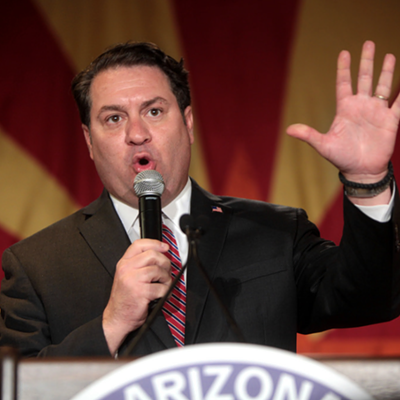After running a recent blog post on local organizations celebrating former Senator Dennis DeConcini's departure from the Corrections Corporation of America board of directors, we heard from a CCA spokesperson that a correction was in order.
This isn't the first time the Nashville-based corporation asked the Tucson Weekly to run a correction of previous posts that may not have painted the private-prison company too positively. The first time was in April 2012, about a coalition's campaign it started the month before to pressure DeConcini to resign from the CCA board (See "Morals Before Profit," March 29, 2012), and a press release linking the company to SB 1070.
We shared the company's response, which stated that any reports that linked CCA to SB 1070 were erroneous, pointing out that while an NPR report claimed CCA supported laws like SB 1070 to support its industry going so far as to help draft the legislation, the public radio company later ran a correction stating that their story "did not mean to suggest that the Corrections Corporation of America was the catalyst behind the law or that it took a corporate position in favor of the legislation."
This time around, Steven Owen, CCA's public affairs senior director, asked for a correction based on claims that DeConcini was no longer on the CCA board due to the organized effort of anti-private prison and immigrant-rights groups, including the American Friends Service Committee.
"To be clear," he wrote. "CCA's Proxy Statement, filed April 3, 2014 with the U.S. SEC, states clearly that Sen. DeConcini, along with two other board members, will not be standing for re-election per CCA's Corporate Governance Guidelines."
The CCA guidelines he referred to is mandatory retirement: "No director may stand for election after reaching age 75," yet DeConcini, on the board since 2008, is now 77. Two other board members who now stand for reelection are William F. Andrews, who joined in 2000, and John R. Horne, who joined in 2001.
Owen also asked for an additional correction because the American Friends Service Committee press release announcing DeConcini's departure from CCA referred to SB 1070. However, the press release did not refer to the NPR report or any other that Owen referred to in his request.
We asked AFSC Tucson program director Caroline Isaacs for some perspective, and she described CCA's requests for corrections such as these as a bullying tactic that works to derail the conversation on the private-prison industry.
Isaacs said the press release mentions CCA is "closely linked with SB 1070." To back up that statement, Isaacs said AFSC refers to a June 21, 2010 report by Beau Hodai, "Ties That Bind: Arizona Politicians and the Private Prison Industry," (http://inthesetimes.com/article/6085/ties_that_bind_arizona_politicians_and_the_private_prison_industry) not NPR or AP, as Owen suggested.
And despite CCA's claims, AFSC and others said DeConcini no longer on the board remains a victory.
"Fuerza gets to claim victory. They made it an uncomfortable place to be—to make money off of the incarceration of immigrants and other people," said Matthew Lowen, AFSC Tucson office program coordinator.
To pressure DeConcini off the CCA board, Fuerza claims more than 1,000 postcards were mailed to the former senator asking him to resign; Tucson Unified School Board's decision to part ways with DeConcini's law firm and his departure from the Arizona Board of Regents are linked to the campaign; as well as the NAACP of Maricopa County ethics complaint against DeConcini alleging a conflict of interest being on the CCA board and being on ABOR.
Perhaps, Lowen added it will make other people think twice. "Regardless of his age, he's no longer on the board," and now he has the opportunity to think about the money he's made on the board and perhaps donating to immigrant rights. DeConcini leaves with 17,105 shares of the company valued at $545,000.











